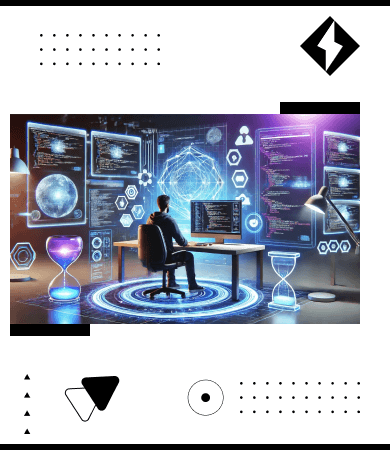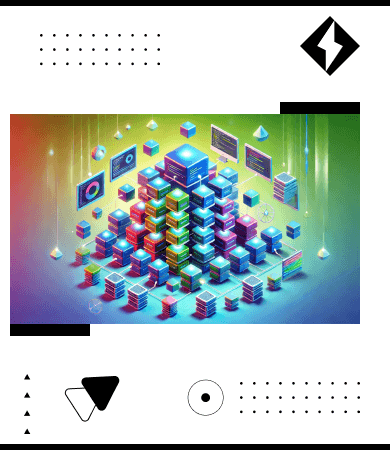Support center +91 97257 89197
Web DevelopmentJuly 9, 2024
Quantum Computing Applications in Web Development

Introduction
Quantum computing represents a paradigm shift in computational power and capabilities, poised to revolutionize various sectors, including web development. By harnessing the principles of quantum mechanics, such as superposition and entanglement, quantum computing offers unprecedented processing speed and problem-solving potential. As the digital landscape evolves, understanding the applications of quantum computing in web development becomes crucial for staying ahead of the curve and leveraging this cutting-edge technology.
Understanding Quantum Computing
Quantum computing leverages qubits, which, unlike classical bits that represent either 0 or 1, can exist in multiple states simultaneously. This phenomenon, known as superposition, allows quantum computers to process vast amounts of data in parallel. Entanglement, another key concept, enables qubits that are entangled to instantly affect each other's state, no matter the distance. These principles underpin the immense computational power of quantum computers, distinguishing them from classical computers that perform sequential processing.
Quantum computers are still in the nascent stages of development, with major tech companies and research institutions making significant strides. While practical, large-scale quantum computers are yet to be realized, the progress in this field holds promise for transformative applications in various domains, including web development.
Potential Applications of Quantum Computing in Web Development
-
Enhanced Cryptography Quantum computing can revolutionize web security through quantum key distribution (QKD) and post-quantum cryptography. QKD uses quantum mechanics principles to create secure communication channels that are theoretically unbreakable. Post-quantum cryptography aims to develop encryption algorithms resilient to quantum attacks, ensuring data security in a quantum future.
-
Improved Data Processing and Storage Quantum databases can handle and process massive amounts of data more efficiently than classical databases. Quantum computing's ability to analyze and extract insights from big data sets can significantly enhance web analytics, enabling more precise user behavior predictions and personalized experiences.
-
Optimized Algorithms for Web Development Quantum algorithms can expedite search operations and data sorting, leading to faster and more responsive web applications. For instance, Grover's algorithm provides a quadratic speedup for unstructured search problems, while Shor's algorithm can factorize large numbers exponentially faster, impacting cryptographic security.
-
Quantum-Enhanced Artificial Intelligence Quantum computing can boost machine learning models by accelerating data processing and improving optimization techniques. This can result in more accurate predictive models, enhanced natural language processing (NLP) for chatbots, and sophisticated recommendation systems, enriching user interactions on web platforms.
Challenges and Limitations
Despite its potential, quantum computing faces several challenges:
- Technological Barriers: Building stable qubits and maintaining coherence is technically demanding, with current quantum computers operating with limited qubits and high error rates.
- Integration with Existing Technologies: Adapting quantum computing to integrate seamlessly with classical computing systems and existing web technologies poses significant hurdles.
- Cost and Accessibility: Quantum computing resources are currently expensive and not widely accessible, limiting the immediate adoption by web developers and smaller enterprises.
Case Studies and Real-World Examples
Several companies and institutions are making strides in integrating quantum computing with web development:
-
IBM's Qiskit and Quantum Advantage IBM's Qiskit provides an open-source framework for programming quantum computers. Developers can experiment with quantum circuits and algorithms, gaining practical insights into how quantum computing can enhance web applications. IBM has collaborated with various universities and tech companies to explore quantum computing's potential in areas like cryptography and machine learning.
-
Google's Quantum AI Google has achieved significant milestones with its Quantum AI lab. Their research on quantum supremacy demonstrates the potential for quantum processors to outperform classical ones. Google’s advancements in quantum algorithms can lead to optimized data processing and enhanced web performance, benefiting web developers aiming to create more efficient applications.
-
Microsoft's Quantum Development Kit Microsoft’s Quantum Development Kit (QDK) offers tools and resources for developers to learn and implement quantum computing. The QDK includes a quantum simulator, Q# programming language, and integration with Visual Studio. These resources help web developers explore quantum computing's applications and prepare for its broader adoption.
-
Rigetti Computing's Quantum Cloud Services Rigetti Computing offers Quantum Cloud Services (QCS), providing developers with access to quantum processors through a cloud-based platform. This allows web developers to experiment with quantum algorithms and integrate quantum computing into their applications without the need for specialized hardware.
Future Prospects
The future of quantum computing in web development holds immense promise. As the technology evolves, several trends and advancements are expected:
-
Scalability and Stability Quantum computing research aims to develop more stable qubits and scalable systems. Achieving error correction and coherence stability will make quantum computers more reliable for practical applications in web development.
-
Quantum Internet The concept of a quantum internet, where quantum signals can be transmitted securely over long distances, is gaining traction. This could revolutionize web security and data transmission, providing unparalleled encryption and privacy.
-
Hybrid Quantum-Classical Computing Hybrid systems that combine classical and quantum computing will become more prevalent. These systems will leverage the strengths of both paradigms, allowing web developers to optimize specific tasks with quantum computing while maintaining overall system efficiency with classical computing.
-
Increased Accessibility As quantum computing technology matures, the cost of quantum resources is expected to decrease, making it more accessible to a broader range of developers and organizations. This democratization will foster innovation and widespread adoption in the web development community.
Getting Started with Quantum Computing for Web Developers
Web developers can take several steps to begin exploring quantum computing:
-
Educational Resources
Online Courses: Websites like Coursera, edX, and Udacity offer comprehensive courses on quantum computing, covering topics from basic principles to advanced algorithms.
Books and Publications: Books such as "Quantum Computing for Computer Scientists" and research papers provide in-depth knowledge and insights. -
Development Tools :
Qiskit: IBM's open-source quantum computing framework allows developers to write quantum algorithms and run them on simulators or actual quantum processors.
Cirq: Google’s quantum computing framework focuses on creating, optimizing, and executing quantum circuits.
QDK: Microsoft’s Quantum Development Kit provides a comprehensive environment for learning and developing quantum applications. -
Community Engagement
Forums and Groups: Joining communities like the Qiskit Community, Quantum Computing Stack Exchange, and attending quantum computing meetups can provide support and networking opportunities.
Hackathons and Competitions: Participating in quantum computing hackathons and coding competitions can offer practical experience and exposure to real-world applications.
Conclusion
Quantum computing is set to revolutionize web development by enhancing security, optimizing algorithms, and advancing AI capabilities. Despite current challenges, the progress in quantum technology promises a future where quantum computing becomes an integral part of web development. Web developers should proactively explore this field, leveraging available resources and tools to stay ahead in the evolving digital landscape.
TLDR
Quantum computing is revolutionizing various fields, including web development. This blog explores the basics of quantum computing, its potential applications in web development, challenges, real-world examples, and future prospects. Learn how quantum computing can enhance cryptography, data processing, algorithms, and AI in web development.
FAQs
Quantum computing can significantly improve web application security through advanced cryptographic techniques such as quantum key distribution (QKD) and post-quantum cryptography. These methods offer stronger protection against potential cyber threats, making data transmission and storage more secure.
Quantum computing can optimize web development algorithms by leveraging its superior processing power. For example, quantum algorithms can perform faster searches and data sorting, leading to more efficient and responsive web applications.
Yes, quantum computing can enhance machine learning models by processing large datasets more efficiently and accurately. This can lead to better predictions, recommendations, and personalized experiences for users on web applications.
While quantum computing is still in its early stages, several companies and research institutions are exploring its potential in web development. For instance, projects focused on quantum-enhanced machine learning and quantum cryptography for secure communications are currently underway.
Web developers can utilize various tools and frameworks to begin working with quantum computing, such as IBM's Qiskit, Google's Cirq, and Microsoft's Quantum Development Kit. These resources provide the necessary platforms and libraries to develop and experiment with quantum algorithms.
Work with us







